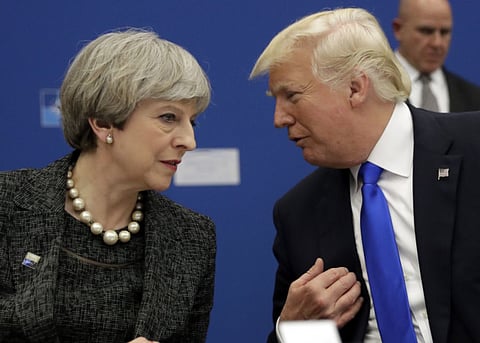Future of Nato depends on Britain
With Trump giving the definite impression that he is no longer interested in the trans-atlantic alliance, stakes are high for London

I’ve lost track of the number of times Nato has found itself in the last-chance saloon, facing existential questions about its relevance, as well as its resolve to defend and protect the interests of the West. The first accusations that Nato was past its sell-by date surfaced in the early 1990s with the collapse of the Iron Curtain. With no Soviet Union to confront, what was the point of maintaining the alliance? That particular navel-gazing exercise ended as soon as the Balkans embarked on an orgy of blood-letting, requiring Nato to mount one military intervention and support another.
Then there were the recriminations that followed the military interventions in Iraq and Afghanistan, which succeeded in eroding all of the goodwill the alliance had shown towards the United States in the wake of the September 11, 2001, attacks, with the near unanimous endorsement for Article Five, the Nato charter’s defining philosophy of all for one, and one for all. On these and other occasions when Nato has been under pressure to justify its existence, the desire of the western democracies to present a united front has guaranteed its survival.
The ability of the US and its European partners to maintain this united front, though, will face arguably its stiffest test when US President Donald Trump arrives for this week’s summit.
Trump has already made it abundantly clear that he does not hold Nato in very high esteem, an attitude that was reflected in his lukewarm backing for America’s continued support for Article Five at the last Nato summit.
For a president whose central mantra is “America First”, his natural instinct is to view Europe with deep suspicion. The White House has already initiated a trade war with Brussels over what Trump regards as the European Union’s (EU) anti-American protectionism. And it seems he is prepared to adopt a similarly robust line with Nato’s European cohort over its long-standing failure to meet its financial obligations, with only a few European states meeting the 2 per cent of gross domestic product spending requirement.
Washington’s irritation over Europe’s failure to pay its way is nothing new. The administration of former US president George W. Bush regularly vented its frustration over Europe’s preference for indulging in bloated welfare budgets rather than making proper provision for the protection of its citizens. It was the same story with the administration of Barack Obama. Former defence secretary Robert Gates used his valedictory speech in 2011 to warn that Europe faced “a dim if not dismal” future if shortages in military spending and political will were not addressed.
And former US vice-president Joe Biden personally remonstrated with British military chiefs on the eve of the 2014 Nato summit in Wales over the dramatic decline in Britain’s military strength that has taken place since the Tories took office in 2010.
Now the Trump administration is focusing on the issue, only this time the president is serious about forcing a change in conduct. And if he doesn’t get his way, he appears perfectly happy to walk away from the alliance altogether.
This is what no doubt prompted Donald Tusk, the EU President, to warn European leaders to prepare for the break-up of the alliance. With Trump giving the definite impression that he is more excited about his forthcoming meeting with Russian President Vladimir Putin than catching up with his Nato colleagues, these are, indeed, challenging times for the alliance. Trump is well aware that, without American firepower, Europe would be hard-pressed to defend itself against further acts of Russian aggression.
Trump claims 20 Nato states are not paying their fair share, and last month wrote sharply-worded letters to several key allies, including Germany, Belgium, Norway and Canada, taking them to task for not spending enough. Nor is Britain immune from Trump’s wrath, even though the government is still trying to cling to the fiction that it fulfils the 2 per cent requirement.
The letter written last month by US Defence Secretary James Mattis to Gavin Williamson, his British counterpart, and which has now been leaked to a tabloid newspaper, lays bare just what the Pentagon thinks of the current state of Britain’s military strength. Mattis expressed his “concern” over Britain’s ability to project military power abroad and warned that France could replace Britain as Washington’s go-to nation in a crisis unless the situation radically improved.
Given France’s infamous unreliability in the realm of military cooperation (Iraq, Afghanistan, the Balkans — to name but a few), it is tempting to wish the Americans “bon courage” in any such enterprise. The reality, though, is that, if the transatlantic alliance is to prevail, it requires Britain, and the British military, to be its bedrock in Europe. And if Britain cannot fulfil this fundamental duty, then, this time, the Nato alliance really has no chance of survival.
— The Telegraph Group Limited, London, 2017
Con Coughlin is the Daily Telegraph’s defence editor and chief foreign affairs columnist.



